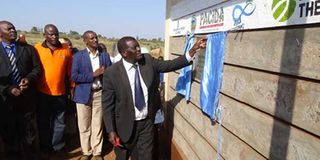Relief for locals as Marsabit’s Dirib Kombo gets water kiosks

Marsabit County Water Executive Joseph Waqo Guyo officially launches the operation of the water kiosks in Dirib Kombo in Saku Sub-County on January 24, 2017. PHOTO | IRENE MWENDWA | NATION MEDIA GROUP
What you need to know:
Pacida chief executive Patrick Katelo says the water source is permanent and there is no schedule for fetching.
He said that the two kiosks were put up at a cost of about Sh2 million.
The CEO said they have put up two kiosks in the location, thus eliminating the long queues.
Residents of Dirib Kombo Sub-Location in Saku Sub-County now have a permanent water source amid the crisis that faces Marsabit County.
The locals Wednesday held a meeting with the Kenya Rapid, Food for the Hungry (FH) and Pastoral Community Initiate Development Assistance (Pacida) where the water ATM kiosk was officially opened.
According to Pacida chief executive Patrick Katelo, the water source is permanent and there si no schedule for fetching.
BOREHOLE WATER
Mr Katelo said that unlike other two ATMs that have been launched in Marsabit Town whose source is a spring that could run dry, the source for Dirib Kombo water is a borehole.
"For those in town, residents always have to alternate between the two ATM kiosks and they fetch after two weeks with limitations unlike here. In Dirib Kombo as long as your card is loaded one can fetch (water) at any time," said Mr Katelo.

Residents of Dirib Kombo in Saku Sub-County, Marsabit, fetching water from an ATM kiosk on January 24, 2017. PHOTO | IRENE MWENDWA | NATION MEDIA GROUP
NO QUEUES
The CEO said they have put up two kiosks in the location, thus eliminating the long queues previously witnessed when people are fetching water.
He said that the two kiosks were put up at a cost of about Sh2 million.
"This will ensure accountability as well as give a source of income to the community who are the major beneficiaries from funds collected when the water is sold,” he said.
A household consumes at least 100 litres of water per day.
EASY TO USE
Qabale Ibrahim, a beneficiary of the project, told Nation that it is more efficient and easy to use the water ATM.
She said that although she has to walk a distance to the kiosk, she is sure to go home with water.
"Previously, we would go for long distances and still go home without water but now, no matter the time, we can access the water," said Ms Qabale.
The water ATM is part of strengthening community resilience programme that is funded by USAID through FH and implemented by Pacida.
REGISTERED CARD
Every household is provided with a registered card that is loaded with the amount they provide through a Safaricom prepaid line that is installed in the dispenser.
The card is what they swipe to fetch water at the kiosk.
Water in the region retails at Sh40 to Sh50 per a 20-litre jerican because the commodity is scarce and few people can afford to buy from water truckers.
But with the ATM water dispenser project, locals access the same amount of water for only five shilling.




